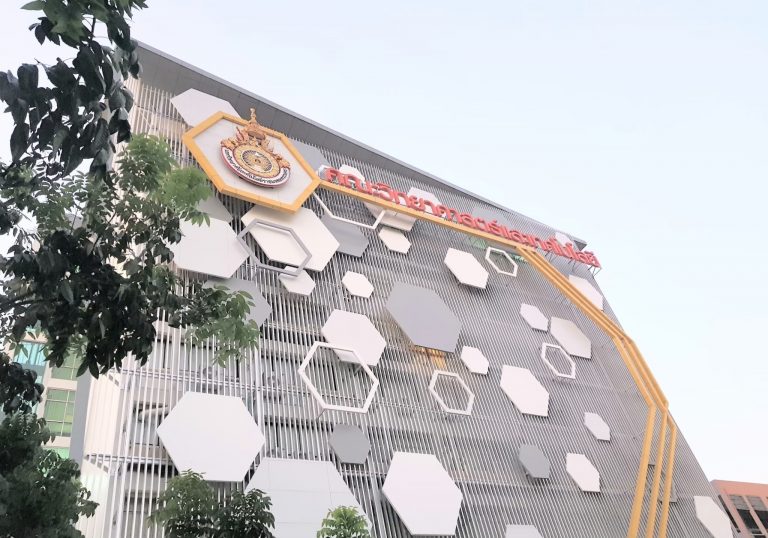
Rajamangala University of Technology Phra Nakhon was established in accordance with the Rajamangala University of Technology Act on January 18, 2005.
Rajamangala Institute of Technology was created by combining 5 former campuses together, comprising Thewet Campus, Chotiwet Campus, Phra Nakhon Commercial College Campus, Chumphon Khet Udomsak Campus and North Bangkok Campus.
Presently, it is divided into 4 centers to provide teaching and learning: Thewet Center, Chotiwet Center, Phra Nakhon Commercial Center, and North Bangkok Center.
The Faculty of Science and Technology was established on 28 November 2006, according to Ministerial Regulations on the Establishment of Government Agencies in Rajamangala University of Technology Phra Nakhon, Ministry of Education 2006.
The faculty teaches and produces graduates, and conducts research in science and technology, and y is located at the North Bangkok Center. In 2007, the Faculty of Science and Technology started to offer two Bachelor of Science (B.Sc.) programs: the Computer Technology program (now called the Computer Science Program)m and the Environment and Natural Resources Program (now called the Program in Environmental Science and Technology).
In 2014, another Bachelor of Science program was offered, namely the Industrial Materials Science Program. In 2019, the Bachelor of Science program in Data Science and Information Technology was offered. In 2023, two more Bachelor of Science programs were offered, namely the Health Technology, Cosmetics and Anti-Aging; and Information Statistics. Currently, the Faculty of Science and Technology provides undergraduate level teaching and learning in 6 Bachelor of Science program (B.Sc.) as follows
- B.Sc. Computer Science
- B.Sc. Environmental Science and Technology
- B.Sc. Industrial Materials Science
- B.Sc. Data Science & Information Technology
- B.Sc. Health, Cosmetic and Anti-Aging Technology
- B.Sc. Information Statistics
List of Deans, Faculty of Science and Technology
Deans’ Names
- Dr.Jirasak Tharajak, 26 January 2020 – present
- Dr.Paisan Kanthang, 26 January 2016 – 25 January 2020
- Assistant Professor Dr. Amara Amornkaew, 26 January 2012 – 25 January 2016
- Assistant Professor Pratuengthip Rojanavipat (Acting Dean), 3 October 2011 – 25 January 2012
- Acting Second Lieutenant Wichai Kosalawat, 2 February 2011 – 2 October 2011
- Mrs. Suraporn Kittisarawanno, 2 February 2007 – 1 February 2011
At present, the educational administration paradigm of educational institutions cannot focus only on producing quality graduates according to the curriculum. The concept of education must be adjusted to produce graduates who can pursue lifelong learning, and capable of seeking knowledge, and applying knowledge appropriately and systematically based on infinite data (Big data). Moreover in future, it is also necessary to reflect upon changes in the social structure, in the context of an aging society, and the development of technological innovation in the industrial sector towards the era of Industry 4.0 (Industry 4.0), and consider the direction of organizational changes. Educational institutions must adjust their strategies, policies, strategies in order to produce graduates that would meet the needs of various sectors, who would achieve the fullest extent of one’s ability. The Faculty of Science and Technology recognizes the importance of teaching and learning in the present era, which must be in line with changes in social and industrial structures and the Education Policy 4.0 (Education 4.0).
- Develop teaching and learning processes based on science, mathematics and technology (STEM).
- Develop research, inventions, and innovations based on science, mathematics, and technology.
- Academic services and knowledge transfer To develop communities and society sustainably according to the Sufficiency Economy Philosophy.
- Create a cooperation network (Collaboration)
Currently, the offices and teaching facilities of the Faculty of Science and Technology are located in the Faculty of Science and Technology building (formerly the 40th Anniversary Memorial Building)
In 2015, improvements were made to modernize the building’s internal and external structures. Scientific laboratories have been upgraded; information technology and lecture rooms to support the development of teaching and learning in context of education in the digital age (Digital education); Scientific Instrument and Service Center (SISC) to provide testing and analysis services for the society, students, professors, researchers both inside and outside the university, as well as government and private agencies, and particularly research and testing services for the industrial sector.
